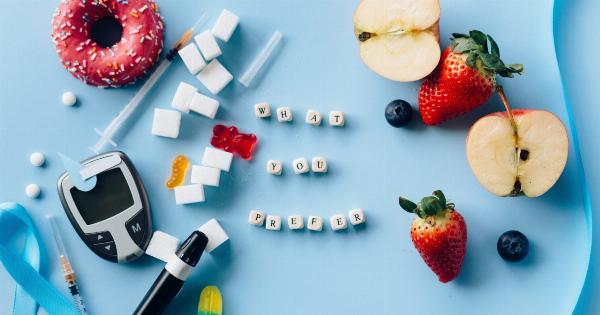Diabetes is a chronic condition that affects millions of children around the world. Managing diabetes requires a comprehensive approach, and nutrition plays a crucial role in maintaining optimal health.
One essential nutrient that can boost kidney protection for children with diabetes is Vitamin B. In this article, we will explore the benefits of Vitamin B and how it can support kidney health in children with diabetes.
The Importance of Kidney Protection in Children with Diabetes
Kidneys are vital organs responsible for filtering waste products and excess fluids from the bloodstream. However, diabetes can lead to significant damage to these organs over time.
High glucose levels in the blood can damage the small blood vessels in the kidneys, impairing their function. This condition is known as diabetic nephropathy.
In children with diabetes, kidney protection is of utmost importance to prevent complications such as kidney failure. Incorporating Vitamin B into their diet can offer a natural and safe way to enhance kidney protection and overall well-being.
Understanding Vitamin B and its Forms
Vitamin B is a group of water-soluble vitamins that play vital roles in many bodily functions, including the metabolism of carbohydrates, proteins, and fats. It also aids in the production of energy and the maintenance of healthy skin, hair, and eyes.
There are several forms of Vitamin B, including:.
- Vitamin B1 (Thiamine)
- Vitamin B2 (Riboflavin)
- Vitamin B3 (Niacin)
- Vitamin B5 (Pantothenic Acid)
- Vitamin B6 (Pyridoxine)
- Vitamin B7 (Biotin)
- Vitamin B9 (Folate)
- Vitamin B12 (Cobalamin)
Vitamin B and Kidney Protection in Children with Diabetes
Research suggests that certain forms of Vitamin B can promote kidney protection, especially in individuals with diabetes.
Vitamin B1 (Thiamine)
Thiamine has been found to have antioxidative properties and plays a crucial role in protecting kidney cells from damage caused by high blood glucose levels.
Studies indicate that adequate levels of Thiamine can reduce the risk of developing diabetic kidney diseases and slow down their progression.
Vitamin B3 (Niacin)
Niacin has been shown to improve kidney function and reduce the risk of kidney damage in individuals with diabetes. It helps dilate blood vessels, improving blood flow to the kidneys and reducing inflammation.
Additionally, Niacin helps regulate cholesterol levels and protects against cardiovascular complications, which often accompany kidney problems.
Vitamin B6 (Pyridoxine)
Pyridoxine is involved in various metabolic processes in the body, including glucose metabolism. Studies suggest that Vitamin B6 can reduce the risk of diabetic nephropathy by preventing the buildup of glucose-derived toxins in the kidneys.
It also helps maintain healthy levels of protein, a key factor in kidney protection.
Vitamin B9 (Folate)
Folate plays a crucial role in preventing kidney damage in individuals with diabetes. It helps reduce homocysteine levels, a compound linked to kidney damage, by aiding in its breakdown.
Adequate levels of Folate can help maintain kidney health and prevent complications associated with diabetes.
Food Sources of Vitamin B
Ensuring a diet rich in Vitamin B is essential for children with diabetes looking to boost kidney protection. Here are some nutrient-dense food sources of Vitamin B:.
Vitamin B1 (Thiamine)
- Pork
- Legumes
- Nuts and seeds
- Whole grains
Vitamin B2 (Riboflavin)
- Organ meats (liver, kidney)
- Dairy products
- Eggs
- Leafy green vegetables
Vitamin B3 (Niacin)
- Chicken
- Turkey
- Tuna
- Mushrooms
Vitamin B5 (Pantothenic Acid)
- Avocado
- Chicken
- Potatoes
- Yogurt
Vitamin B6 (Pyridoxine)
- Oily fish (salmon, tuna)
- Chickpeas
- Bananas
- Fortified cereals
Vitamin B7 (Biotin)
- Egg yolks
- Almonds
- Walnuts
- Spinach
Vitamin B9 (Folate)
- Leafy green vegetables
- Lentils
- Asparagus
- Citrus fruits
Vitamin B12 (Cobalamin)
- Shellfish
- Beef
- Poultry
- Fortified plant-based milk
Consulting with a Healthcare Professional
While incorporating Vitamin B through diet is generally safe, it is important to consult with a healthcare professional or a registered dietitian before making any significant changes to a child’s diet, especially if they have diabetes.
They can provide personalized recommendations and guidance based on the specific needs and medical conditions of the child.
Summary
Vitamin B offers significant kidney protection benefits for children with diabetes.
Incorporating Vitamin B1, B3, B6, and B9 into their diet through nutrient-rich foods can help reduce the risk of kidney damage and slow down the progression of diabetic nephropathy. Ensuring a balanced diet with ample sources of Vitamin B, along with regular medical check-ups, can greatly contribute to the overall well-being of children with diabetes and their kidney health.





























